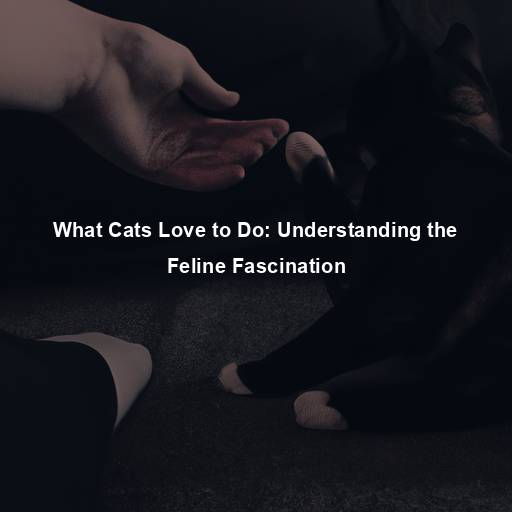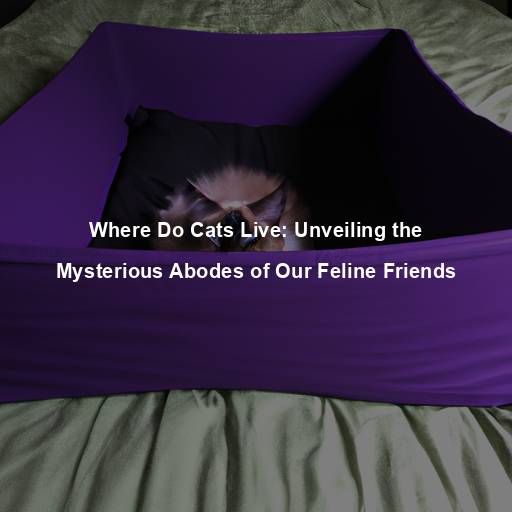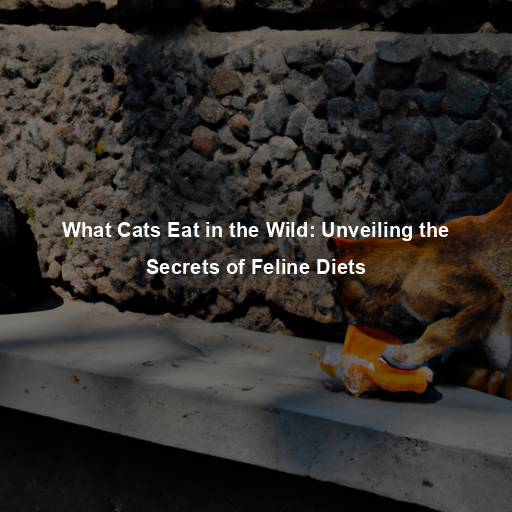Do Cats Eat Mice: Unveiling the Feline Hunting Instinct
Last Updated on July 19, 2023 by Evan
Contents [hide]
- 1 Understanding the Feline Hunting Instinct
- 2 The Fascinating Relationship Between Cats and Mice
- 3 The Truth Behind Cats Eating Mice
- 4 Nurturing the Hunting Instinct: A Balancing Act
- 5 Debunking Common Myths
- 6 The Cultural Significance of Cats and Mice
- 7 The Fascination with Cat Videos
- 8 FAQs: Do Cats Eat Mice?
Understanding the Feline Hunting Instinct
There’s something undeniably enchanting about our feline friends, their mysterious aura and captivating grace. We find ourselves in awe of their innate ability to tap into their primal instincts, particularly the art of hunting. Have you ever pondered the age-old question of whether our beloved cats indulge in the consumption of mice? Join us as we embark on an exploration of the intriguing world of feline hunting, unraveling the enigmatic reasons behind their behavior and unveiling the truth behind this perplexing feline phenomenon.
The Natural Hunters of the Animal Kingdom
Cats belong to the family Felidae, which includes both domesticated and wild feline species. From the ferocious lions roaming the African savannahs to the agile cheetahs sprinting across the plains, the hunting prowess of these feline creatures is unparalleled. This hunting instinct is deeply ingrained in their DNA, a trait that has been passed down through countless generations.
The Evolutionary Roots of the Hunting Instinct
To understand why cats have such a strong hunting instinct, we must examine their evolutionary history. Cats evolved from solitary hunters, where their survival depended on their ability to catch prey efficiently. This instinctual behavior has been preserved even in domesticated cats, who may never have faced the challenges of surviving in the wild.
The Fascinating Relationship Between Cats and Mice
The Chase and Capture
It’s no secret that cats have an innate talent for hunting, and who can blame them? Mice, with their speedy scurrying and petite frames, practically beg to become their next conquest. Witnessing a cat in pursuit is like witnessing a live-action thriller, where every movement is laced with anticipation and every muscle is primed for the ultimate pounce. The intensity is palpable, evident in the crouched pose, the mesmerizing dilated pupils, and that tantalizingly flickering tail, all capturing the essence of a feline predator locked in a perplexing game.
The Role of Play
It is important to note that cats’ fascination with mice goes beyond a mere desire for a meal. Many times, the act of hunting is driven by the instinctual need to engage in play. Cats derive immense joy and satisfaction from the pursuit, regardless of the outcome. Even if they do not intend to consume the caught prey, the chase and capture in itself provide mental and physical stimulation for our feline friends.
The Relationship Between Domestic Cats and Mice
In the case of domesticated cats, mice can be seen as both prey and a potential threat. While some cats may view mice as a playmate, others may perceive them as invaders, posing a risk to their territory. This duality in their reaction to mice can be influenced by various factors, including their upbringing, individual personality traits, and previous encounters with mice or other small animals.
The Truth Behind Cats Eating Mice
The Variations in Hunting Behavior
While cats are proficient hunters, their preference for consuming mice may vary from one cat to another. Some cats may indeed consume the mice they catch, while others may simply leave the lifeless bodies as a token of their hunting prowess. It is important to remember that domesticated cats are often well-fed and may not feel the need to consume their prey for sustenance.
The Role of Instinct and Nutrition
Cats, those enigmatic creatures we adore, harbor a fascinating dietary secret. Nature has crafted their bodies with the curious ability to extract vital nutrients solely from animal tissue, a trait known as obligate carnivory. This means their very survival hinges on indulging in a high-quality protein feast. Nevertheless, the pampered pussycats of our homes often partake in nutritionally complete meals lovingly prepared by their human caretakers, inadvertently dampening their primal yearning to chase mice or other petite morsels for sustenance.
The Potential Dangers
When contemplating the intriguing dance between cats and mice, one cannot help but ponder the vast complexities that lie beneath the surface. The seemingly natural cycle of life, with cats catching and devouring their tiny prey, holds a certain allure. Yet, it is imperative to delve into the intricate realm of risks that lurk within this age-old feline instinct. In the urban jungles we inhabit, mice can unwittingly carry diseases or become carriers of harmful substances, triggering a wave of perplexity for our precious companions.
Nurturing the Hunting Instinct: A Balancing Act
Providing Alternatives
It’s intriguing to ponder the intricate balance between our feline friends’ innate hunting instincts and the need to preserve their safety within our domestic spheres. Responsible pet ownership entails exploring creative avenues to satiate these primal urges without compromising the sanctity of our community. Engaging in immersive play sessions, employing thoughtfully crafted toys that emulate the allure of potential prey, offers a promising solution to quenching their hunting thirst while safeguarding both their wellbeing and the local wildlife.
Indoor Environments
Unlocking the hidden world of feline fulfillment lies in the sacred art of crafting an indoor haven that tantalizes their deepest instincts. By presenting a symphony of scratching posts, regal climbing trees, and enigmatic puzzle feeders, we can bewilder their curious minds and ignite the flame of adventure within. Furthermore, this enchanting tapestry of feline welfare not only ensures their natural yearnings are met but also gifts them with a flourishing existence, where joy intertwines seamlessly with vitality.
The Ecological Balance
While cats may enjoy the thrill of hunting mice, it is essential to consider the impact of their actions on the local ecosystem. In some regions, feral or outdoor cats can pose a threat to native wildlife populations, particularly small mammals and birds. This is especially true in areas where natural predators are limited, and prey species may already be under pressure from other environmental factors. It is crucial for pet owners to be mindful of the potential ecological consequences and take necessary measures to prevent their cats from hunting and endangering local wildlife.
Responsible Cat Ownership
As conscientious individuals who share our lives with feline companions, we wield the power to safeguard the harmonious balance between our beloved pets and the natural habitat we call home. Embracing the notion of an indoor lifestyle for our whiskered friends or fostering enclosed outdoor spaces, like the enchanting realms of catios, emerges as the paramount solution to curb their hunting instincts and mitigate the toll on our fragile wildlife ecosystem. Moreover, embracing the practice of spaying or neutering our esteemed feline companions unravels an additional layer of fortification, pacifying their innate yearning to wander and ensuring the preservation of delicate species teetering on the precipice of vulnerability.
Debunking Common Myths
Myth: Cats Only Hunt When Hungry
Contrary to popular belief, cats do not hunt solely out of hunger. While their innate hunting instincts drive them to chase and capture prey, the motivation behind their actions can vary. Cats may hunt for play, territorial defense, or simply to exercise their natural instincts. It is important to understand that hunting behavior is not solely driven by the need for food.
Myth: Cats Kill Mice Out of Spite
There’s a popular misconception floating around about cats and their hunting habits – the belief that they kill mice out of sheer spite or a desire for revenge. However, this idea couldn’t be further from the truth. The act of cats presenting their prey to their human caregivers is actually an instinctual behavior, showcasing their hunting prowess rather than expressing malice. In fact, many experts believe that cats may view their owners as an extension of their social group, presenting them with their captured prey as a way to share and seek approval.
Myth: Cats Are Ineffective Pest Control
Cats have long been admired for their innate ability to catch elusive critters, but not every feline is a master hunter. Over time, these captivating creatures have found their place as loyal companions and effective pest controllers in agricultural environments, where they proved to be a vital force in curtailing pesky rodent populations. Nevertheless, it’s worth noting that not all cats possess the same prowess when it comes to hunting, so their efficacy as pest control agents may differ from one whiskered wonder to another.
The Cultural Significance of Cats and Mice
Cats in Folklore and Mythology
Cats have captivated human imagination for centuries, appearing in various folklore and mythological tales. In many cultures, cats are associated with mystery, agility, and independence. Their hunting abilities often symbolize cunning and stealth. From the ancient Egyptian reverence for Bastet, the goddess of home, fertility, and protection, to the mischievous Cheshire Cat in Lewis Carroll’s “Alice’s Adventures in Wonderland,” cats have left an indelible mark on human culture.
The Symbolism of Mice
Similarly, mice hold symbolic significance in different cultural contexts. In some cultures, mice are seen as symbols of resourcefulness and adaptability due to their ability to thrive in various environments. They are also associated with curiosity and exploration, attributes that align with their tendency to scurry about in search of food and shelter. The relationship between cats and mice in folklore often represents the eternal struggle between predator and prey, reflecting the delicate balance of nature.
The Fascination with Cat Videos
The Rise of Cat Videos
Over the past few years, the worldwide web has become a hotbed for an array of feline-focused phenomena, with an overwhelming surge in cat-centric content. From captivating clips of fluffy kittens engaging in play with alluring yarn balls to intense battles between our whiskered companions and perplexing laser pointers, these videos effortlessly tug at our heartstrings. It’s truly awe-inspiring how these footage pieces have the power to evoke a torrent of emotions, ranging from sheer delight to uncontrollable fits of laughter. The infusion of these videos with the raw, untamed instincts of cats, a reminder of their inherent behavior, only adds to their appeal.
The Therapeutic Effects
Beyond entertainment, cat videos have also been found to have therapeutic effects on viewers. Watching these videos can evoke feelings of happiness, reduce stress levels, and provide a much-needed sense of companionship. The playful hunting behavior displayed by cats in these videos taps into our innate appreciation for nature and the animal kingdom, fostering a deeper connection with our feline friends.
FAQs: Do Cats Eat Mice?
Can cats eat mice?
Yes, cats are natural predators and they have a strong instinct to hunt. Mice are one of the most common prey animals for cats, and many cats will hunt and eat mice if given the opportunity.
Why do cats eat mice?
Few things in this enigmatic world are quite as fascinating as the captivating behavior of our feline friends. Unleashing their innate instincts, cats, the true carnivores of the animal kingdom, embrace their role as skilled hunters with an air of mesmerizing mystery. The tantalizing pursuit, the chasing of shadows, and the glorious victorious moments as they capture their prey in a fierce and calculated dance – it all plays into the intricate tapestry of their nature. While it may seem puzzling to some, this inquisitive nature serves a vital purpose, as the humble mouse becomes a veritable feast, providing a veritable cornucopia of nourishing sustenance essential for the optimal well-being of these enigmatic creatures.
Do all cats eat mice?
It’s a peculiar fact that not every feline friend will indulge in a mouse feast. Despite their innate hunting prowess, there are domestic cats who haven’t had the chance to encounter these petite prey creatures or showcase their lurking prowess. Furthermore, a handful of cats have been confined to indoor environments throughout their lives, depriving them of the opportunity to nurture their hunting instincts. Such idiosyncrasies give a fascinating glimpse into the complex nature of our beloved feline companions.
Is it safe for cats to eat mice?
When it comes to feline feasting, the question of whether cats should indulge in a rodent banquet can leave even the most savvy cat parent puzzled. On one hand, there seems to be a longstanding tradition of feline munching on these small critters. But, lurking in the shadows are the eerie possibilities of lurking parasites, sneaky diseases, and even toxic substances that could find their way into a mouse’s belly. Staying on the side of caution, it’s crucial to make sure that the mice your cat crosses paths with are in tip-top health, free from any lurking dangers that may threaten their wellbeing. So, next time you catch your ferocious feline hunting, maybe it’s time to play detective and ensure that their prey is without any potential hazards.
Should I let my cat eat mice?
Allowing your cat to hunt and eat mice is a personal decision. If your cat has access to the outdoors, it is natural for them to hunt and catch small prey like mice. However, if you have concerns about the safety of the mice or potential health risks for your cat, you may want to consider other methods of discouraging hunting behavior, such as using interactive toys or providing ample playtime and stimulation indoors.
Will eating mice make my cat sick?
While eating mice is generally safe for cats, there is a potential risk of acquiring parasites or diseases from the prey. Regular deworming and vaccinations can help minimize these risks. If you notice any signs of illness in your cat after consuming a mouse, it is essential to consult with a veterinarian for proper diagnosis and treatment.
Do cats continue to hunt mice if they are well-fed?
Cats’ hunting behaviors are not solely driven by hunger. Even well-fed cats may engage in hunting activities. Hunting provides mental and physical stimulation to cats, which can help prevent behavioral problems and keep them mentally sharp. However, the frequency of hunting may be influenced by how satisfied they are with their regular diet.
Can I train my cat to stop hunting mice?
While you cannot entirely eliminate a cat’s natural instinct to hunt, you can redirect their hunting behavior. Providing interactive toys that simulate prey, engaging in regular playtime, or utilizing puzzle feeders can help satisfy their hunting instincts without involving live prey. Additionally, teaching your cat the “leave it” or “drop it” command can help discourage them from bringing live mice into your home.







